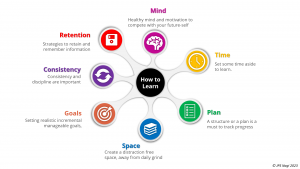Links to all 5 parts in this series
How to Learn Almost Anything, Part 1 of 5 – Introduction
How to Learn Almost Anything, Part 2 of 5 – Time & Plan
How to Learn Almost Anything, Part 3 of 5 – Space & Goals
How to Learn Almost Anything, Part 4 of 5 – Consistency & Retention
How to Learn Almost Anything, Part 5 of 5 – Mind
Learning something new can be intimidating. With so much information out there, it can be hard to know where to start or how to approach the task of mastering a new skill. There is an efficient way to get started that often yields fast results. In this last post on this topic, we look at how our Mind and how our state of mental health will affect learning.
Mind, or Your Mental Health
If anything, the pandemic taught us that it is important to take care of your mental health. And this also applies to learning. Learning new skills can be an intimidating process, and it’s easy to get in our heads when we’re learning something new. It can seem like everyone else is so much better than us and that we will never measure up. When I am asked, I am not competing with anyone – I am competing with myself. I often ask myself this question to myself – What can I do to become a better version of myself? How can I be a better listener, or how can I play those difficult barre chords on my guitar?
Like anyone else, I get those negative feelings too. I found that there are ways to combat these negative thoughts and stay positive during the learning process. I often just stop what I am doing, and start cooking – which relaxes me. Find your relaxation and your comfort zone; go there, and do what you like. And come back with a fresh mind. I found that my actions are three-pronged.
First of all, it’s important to validate your (negative) feelings. It’s okay if you feel inferior or like you’re not good enough or never going to make it; those thoughts happen to all of us at some point during the learning process. Acknowledging that these thoughts exist is the first step towards overcoming them.
Secondly, it’s also important to remember that you’re not alone in this process. Everyone experiences self-doubt; even those who seem like they have their skill mastered have probably had moments where they felt like they weren’t good enough. Remind yourself that everyone has been where you are right now and that everyone experiences these feelings at some point in their life.
Finally, celebrate small wins. It is important and it helps us stay motivated throughout the learning process when we celebrate small wins along the way. Like singing that song you have been practicing – record it, and send it to your family, and friends. You will be surprised to hear back from them and how tough you have been to yourself.
I always look at how long I have come from when I started, or from last week. Sometimes, I call my mother and play that song that I have been practicing. She tells me how well I am playing. Find that support group among your friends and family. They will help you see your accomplishments and keep you motivated as you continue on your journey.
No matter how difficult or overwhelming the learning process may seem, it’s important to remember that everyone has gone through similar struggles and experienced self-doubt at some point during the journey. The key is staying positive and motivated by validating our feelings, knowing we’re not alone in our struggle, and celebrating every small win along the way! With this mindset, anyone can become an expert on any given topic with enough practice and dedication.
Conclusion
Next time you need to learn something new, use these techniques. By breaking down the task into small, manageable steps and then teaching it to someone else, you can quickly gain a deep understanding of the material. And this is a blueprint for you to adjust and make it your own.
What other methods have you used to efficiently learn new things? Share your tips in the comments below!
JPS Nagi
January 12, 2023
